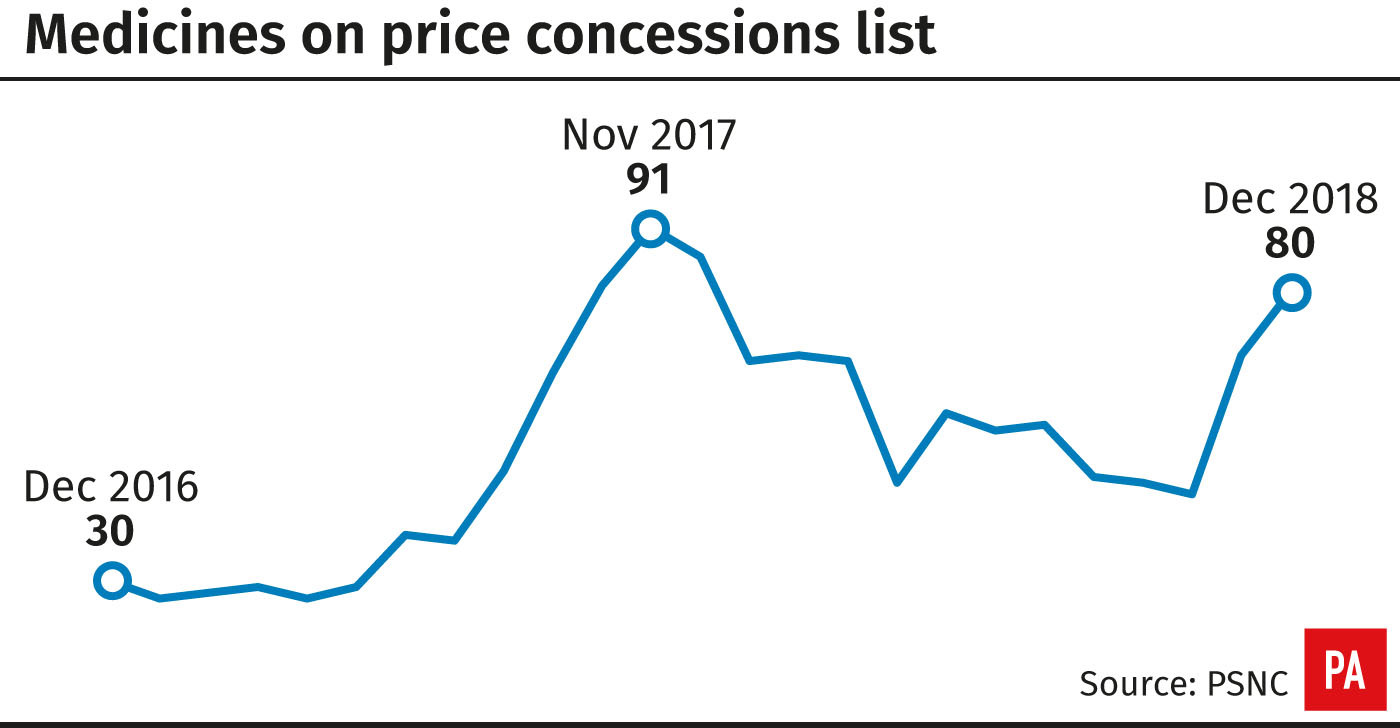Some common medicines ‘in short supply’
Pharmacists say they are having to pay vastly increased prices for some drugs.

There has been a big rise in the number of drugs on a “shortage of supply” list for England, analysis shows.
There are 80 medicines in such short supply that the Department of Health and Social Care has agreed to pay a premium for them, according to data analysed by the BBC.
The figure is up from 45 in October.
Pharmacists said they were struggling to obtain some common medicines and are paying higher prices as a result.
While some experts said uncertainty over Brexit was making the situation worse, others said this was not the case.
Other reasons for the shortage may include increased global demand, cost of raw materials, new regulatory requirements driving up costs and fluctuations in exchange rates.
Another explanation is that the NHS has driven down the prices it will pay for drugs, which makes the UK less attractive to manufacturers.
Gareth Jones, from the National Pharmacy Association, told the BBC: “Uncertainty over Brexit appears to be a significant factor.”
Martin Sawer, executive director of the Healthcare Distribution Association, said people might be stockpiling medicines.
“Some businesses could be speculating on Brexit,” he added. “That’s the nature of the market.”
Sandra Gidley, the former Liberal Democrat MP who is chairwoman of the English Pharmacy Board of the Royal Pharmaceutical Society, told BBC Radio 4’s Today that people should get their prescriptions to pharmacists in time, but should not stockpile.

“There was a group set up by the Department of Health in 2010 to look at these shortages. But it is fair to say that recently the shortages have been worse than ever.
“Every day, there are items that are on a short-term supply problem, so you might have to wait two or three days for them to come in, but they do come in eventually.
“The message to patients is: ‘Please don’t leave picking up your medicines to the last minute at the moment’.”
Ms Gidley added: “Brexit isn’t a factor. Shortages have been a problem for some years. It’s a fluctuating problem. They are now worse then ever.
“The situation with Brexit is that the Government have recognised that there could be potential supply problems and they have been asking manufacturers to keep in a buffer stock so that if there are freight problems, trouble with customs, patients will still get their drugs.
“Unfortunately, what’s been happening on social media over Christmas is that people have been putting two and two together and assuming that this is because of Brexit.
“The pharmaceutical supply chain is a very complex subject. There are global issues at play here.”
The Royal Pharmaceutical Society told the BBC there was “a massive shortage and price spikes”.
A monthly list of drugs in short supply is managed by the Pharmaceutical Services Negotiating Committee (PSNC).
BBC analysis shows that the number of medications on the list has grown six-fold in three years.
During this time, the peak period peak was in November 2017, but there has been a recent rise.
Ash Soni, president of the Royal Pharmaceutical Society, said he had never seen so many common drugs affected by shortages.
He said: “The items are out of stock and unavailable. Patients are having to wait.
“We’re having to send some patients back to the GP to get a different prescription, because we just can’t fill them.”
Gareth Jones of the National Pharmacy Association told the BBC: “Certainly we would advise patients to order medicines in advance if they can do, in case there are any problems. It gives the pharmacist more time to deal with it.
“For the patient generally they can leave it to the pharmacist, who will do everything they can to source the supply.”
One drug on the list for December is furosemide, which is used to treat high blood pressure and other cardiovascular problems.
Other drugs on the list include fluoxetine, which treats depression, and the anti-inflammatory naproxen.
Mr Soni said naproxen went “completely out of stock” recently and he ended up paying £6.49 a box, £2 more than the NHS last agreed to pay for it.
A Department of Health and Social Care spokeswoman said: “The Department has well-established processes to manage and mitigate the small number of supply problems that may arise at any one time due to manufacturing or distribution issues and this has always been the case.
“We continue to work closely with industry and partners to ensure patients receive the medicines they need and pharmacies are reimbursed fairly.
“The vast majority of medicines are not subject to supply problems and every day over two million prescription items are successfully dispensed in England.”





